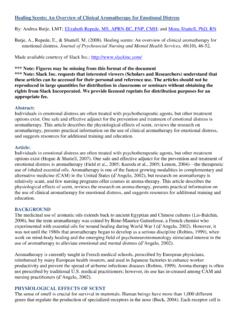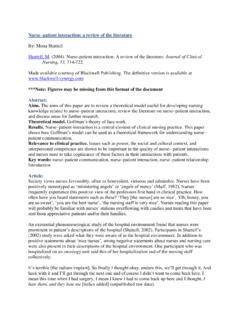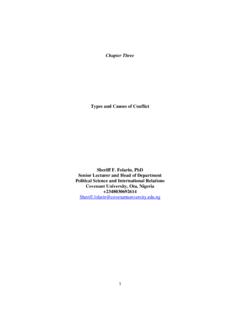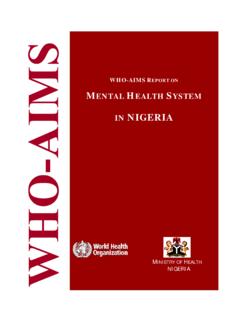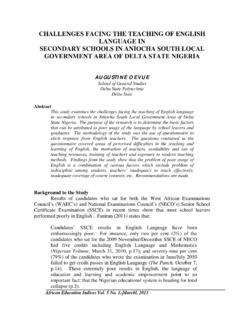Transcription of Corruption in Africa: Causes, Consequences, and Cleanups
1 African and Asian Studies 7 (2008) andAsian StudiesA A SBook ReviewsMbaku, John Mukum. Corruption in africa : causes , consequences , and Cleanups . Lanham: Lexington Books, 2007, 402 pages, cloth; price not stated. Professor John Mukum Mbaku s excellent book is a comprehensive analysis of the impact of Corruption on society. It is a textbook par excellence that provides discussion questions intended to advance students critical and creative thinking on each chapter of the book. Th e book contains a preface, an extensive list of acronyms, twelve chapters and an index.
2 Indeed, the work augments and sheds further light on the author s brilliant publications on the nature and character of Corruption in In the preface, Mbaku introduces the reader to the complex concept of Corruption . Th ough Corruption has existed from time immemorial in all polities, it has recently emerged as an important global issue following the dramatic international political changes that occurred with the end of the Cold War. Th e events of September 11 in the United States also awakened interest in Corruption as terrorists used corrupt officials and practices as means to carry out financial transactions while underground (p.)
3 Ix). Th ough Corruption is said to be semper et ubique, the author focuses on africa mainly because this Garden of Eden with its abundant wealth in gold, diamond, copper, uranium, crude oil, and so on is one of the most underdeveloped regions in the world largely due to the effects of corrup-tion (p. x). Th e first chapter of the book is a general introduction that historicizes and contextualizes the study against the backdrop of the character of the weak African state (p. 2). Th e state is typically seen as responsible for maintaining law and order and providing public goods, but governments in africa have seldom held up to this standard.
4 Th e model of development intended to move the continent to greater heights following independence was statism, in which the government is in charge of resource allocation and intervenes in the market regularly in order to advance this objective. But this framework of development has failed to improve standards of living for a greater number of the population or foster and boost the economy (p. 4). Koninklijke Brill NV, Leiden, 2008 DOI: See J. M. Mbaku, Bureaucratic and political Corruption in africa : Th e Public Choice Perspective (Malabar, Fl: Krieger Publishing Company 2000); J.
5 M. Mbaku (ed.), Corruption and the Crisis of Institutional Reforms in africa (Lewiston: NY: Edwin Mellen Press 1998). He has published several articles on Corruption including, but not limited to: Bureaucratic Corruption and the Crisis of Institutional Reforms in africa , Business and the Contemporary World, Vol. 8, No. 3 & 4 (1996); Bureaucratic Corruption in africa : Th e Futility of Cleanups , Th e Cato Journal, Vol. 16, No. 1 (1996); Bureaucratic Corruption and Policy Reform in africa , Th e Journal of Social, political and Economic Studies, Vol.
6 19, No. 2 (1994). 126 Book Reviews / African and Asian Studies 7 (2008) 125-139 In chapter 2, Bureaucratic and political Corruption : Definitions and Measurements, Mbaku fleshes out the concepts of and differences between bureaucratic and political cor-ruption. He begins with different definitions and explanations of Corruption that have been found in the literature which include: Tyranny, deviant behavior, the acceptance of rewards, inter-alia. Operationally, bureaucratic Corruption is defined as misuse of public office for private gain, while political Corruption is defined as the use of laws and institutions to build political parties and help certain politicians become leaders of the state (pp.)
7 11-13). Citizens in developing countries like africa see Corruption as theft of public resources by civil servants and illegal taxation of economic activity. Moreover, Corruption could be dis-played in the forms of nepotism, which is favoring friends, relatives, and acquaintances in the acquisition of goods, services, and employment ( ). Other methods of Corruption include, but are not limited to embezzling public funds, using public office to gain income for personal use, and requiring citizens to pay bribes for welfare or hospital treatment ser-vices (p.
8 22). Th ere are two levels of Corruption , defined as either grand Corruption which involves high ranking officials and large amounts of money, or petty Corruption which involves lower level civil servants and smaller amounts of money (p. 24). Central to this chapter is the analysis of the dynamics of Corruption as a major challenge in africa . Measuring Corruption is also a challenge because most corrupt activities occur in secret and very few, if any, governments subscribe to genuine accountability and transpar-ency in their operations.
9 Th us, the chapter suggests the examination of public financial records as a way of mitigating Corruption . Th e situation is the same concerning auditing and compiling police complaints in order to reduce Chapter 3, Corruption in africa : An Overview of causes and Country Experiences, focuses on the causes of Corruption in africa with special case studies on Nigeria, Ghana, Zaire, and Cameroon (pp. 38-64). Th ese states are among the most corrupt in africa , and in every instance their anti- Corruption efforts amounted to appeasing fluff.
10 Other common characteristics in these states are the lack of efficient and legitimate institutions and adher-ence to the rule of law. How can these vices be ameliorated? Mbaku suggests state recon-struction, democratization, constraints on the state, peace between groups, and promoting economic freedom (p. 51). Other methods for cleaning up Corruption in society might include, but not limited to drafting an adequate constitution, restructuring the oligarchic state, and implementing a pro-people government (pp. 78-79). Chapter 4, which is titled Th e Impact of Corruption on African Economies, the author explains how Corruption is sometimes viewed positively.





